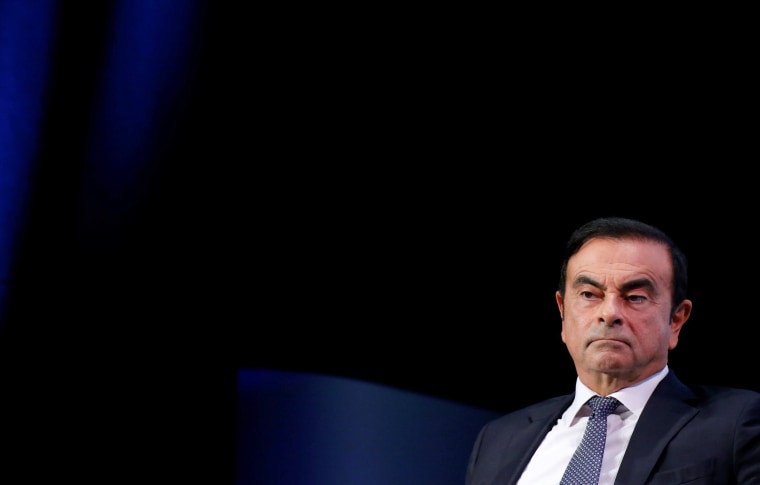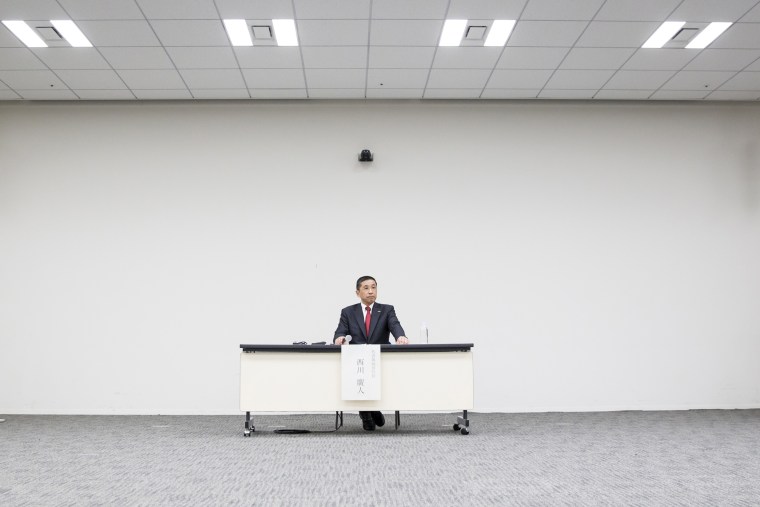The Securities and Exchange Commission has begun a probe of Nissan’s handling of executive pay, the automaker confirmed Monday.
The revelation comes just days after Nissan Chief Executive Officer Hiroto Saikawa said he will step down. Saikawa’s reign has been tarnished by the ongoing scandal surrounding now-ousted Nissan Chairman Carlos Ghosn. The 64-year-old executive was arrested in Tokyo in November and now faces numerous charges there, including allegations he concealed as much as $88 million in pay.
“We have received an inquiry and are cooperating fully” with the SEC probe, Nissan told NBC News, adding, “We cannot provide further details.”
The investigation adds to the problems facing the automaker, which is now launching a search for a new global CEO.
Saikawa’s decision to step down was widely expected in the wake of the Ghosn scandal, after coming under sharp criticism, especially in the West, for his role in the arrest and prosecution of his one-time mentor. The question is whether his decision to step down will help salvage relations between Nissan and Renault, which saved it from bankruptcy two decades ago.
The 65-year-old Nissan chief executive said it was time to “pass the baton,” a move that many observers, both in and outside the alliance had come to expect. In a meeting with reporters, Saikawa said he “respected fully” the new management team at Renault, but he also appeared to be sounding a warning when he stressed that Nissan expects to “play a more active role in the alliance” moving forward.

The crisis began on Nov. 19, when the 64-year-old Ghosn, who served in a variety of different roles within the Renault-Nissan-Mitsubishi Alliance, was arrested for allegations stemmed from an investigation that Saikawa said was touched off by a whistleblower. But many observers quickly began to question whether the case was some kind of coup.
The Nissan CEO did little to dash such concerns when he declared in a news conference that Ghosn had accrued “too much power.” It has been widely reported that Saikawa is likely to seek limits on Renault’s power within the alliance and, in particular, its ability to name new board members and senior executives.
Renault initially was viewed as a white knight when it invested $6 billion to bail out a near-bankrupt Nissan in 1999. The Brazilian-born Ghosn was assigned to oversee that bailout and was soon named the Japanese carmaker’s CEO. He later took the same title at the French automaker while also taking the helm at the umbrella alliance organization. At the time of his arrest, Ghosn had backed out of day-to-day operations at Nissan to oversee turnaround plans for Mitsubishi, which joined the group in 2016. Saikawa took over as Nissan chief executive.
Japanese news media have reported that Ghosn’s trip to Japan was scheduled to allow him to fire Saikawa. In turn, he would have been replaced with one of several executives seen as more open to Renault’s plan to fully merge the two carmakers.
That has been an openly stated goal of the French government, Renault’s largest shareholder. And, with a 43.4 percent stake in its ally, the French carmaker was seen as being in a good position to force such a move.
Cracks in the alliance were immediately apparent. While Nissan and Mitsubishi immediately fired Ghosn following his arrest, Renault refused to dismiss the executive, a move endorsed by several government leaders who said “due process” had to play out.
Last week, Ghosn tendered his resignation through his attorneys. Renault quickly split his duties between Jean-Dominique Senard, who will serve as the French automaker’s new chairman, while Thierry Bolloré, a long-time lieutenant of Ghosn’s, will become its new CEO.
Even then, the automaker and its government backers continued to sound the idea of a merger, something that could make it difficult to heal the bruises caused by the Ghosn affair.
Saikawa is expected to take several months before leaving Nissan. Who will replace him is uncertain. Some are betting on Yasuhiro Yamauchi, the carmaker’s current chief operating officer. But Yamauchi is seen within senior ranks as having been too close to Ghosn.
What’s clear from extensive conversations with executives from both companies is that Renault and Nissan really don’t want to see their alliance break up. With the addition of Mitsubishi, the group surged to the top of the global sales charts in 2017, usurping traditional industry leaders Volkswagen and Toyota. The partnership has paid off in numerous ways, among other things driving down both product development and purchasing costs. At a time when the industry is facing tremendous pressures to invest in autonomous and electrified drive technologies, a break-up could prove risky to all of the alliance members.
